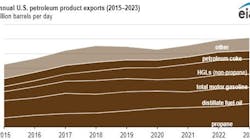Eric Watkins
Senior Correspondent
LOS ANGELES, Feb. 2 -- Short-term prospects for the UK oil and gas industry remain strong, but proposed changes to the country's tax policy have heightened industry concerns about the durability of these trends, according to a report by the Aberdeen and Grampian Chamber of Commerce.
"This survey draws on responses from oil and gas companies employing over 205,000 [people] in the UK and international oil sector and so is significant in highlighting the concerns the industry has over its long-term sustainability," said Derek Henderson, senior partner at Deloitte in Aberdeen, which sponsored the survey.
Geoff Runcie, chamber chief executive, said a recurrent theme throughout three previous Aberdeen and Grampian surveys has been the importance of a stable tax regime to North Sea activity.
Runcie said the British government's recent decision to increase the supplementary North Sea oil charge from 10% to 20% jeopardizes the fiscal stability needed to sustain activity, encourage investment, and maintain North Sea production.
In December, UK Chancellor of the Exchequer Gordon Brown announced a tax increase for oil companies in a move that energy experts predicted could discourage North Sea investment (OGJ, Dec. 12, 2005, Newsletter).
"As we predicted, we can now see the first signs of the impact of the chancellor's prebudget report on investment plans for the UK Continental Shelf (UKCS)," Runcie said.
He said it is ironic that the energy minister recently suggested the energy review should consider the need for the UK to "grow more of its own energy," while the chancellor's imposition of higher taxes undermines the fiscal stability essential for continued North Sea prosperity.
Runcie observed: "Oil that remains in the ground, without the necessary investment to exploit it, pays no tax, employs no people, and offers little encouragement to the Scottish and UK-based service and supply companies who have built impressive export markets."
Survey findings
Key survey findings include:
-- Demand, investment, and drilling activity all rose in the UKCS in 2005, reflecting expectations of sustained high oil prices.
-- Short-term prospects for the UKCS remain strong, with rising investment trends scheduled by producers.
-- Skills concerns, the loss of staff to competitors, and, among producers, the availability of contractors, are seen as significant limits on activity through 2006.
-- There are increased concerns about UK tax policies.
-- Additional concerns about the durability of positive trends in the UKCS have been heightened by recent tax changes.
-- Overseas-based work continued to strengthen in 2005 and is expected to strengthen further in 2006.
-- The percentage of contractors working at or above optimum levels has increased.
Contact Eric Watkins at [email protected].
